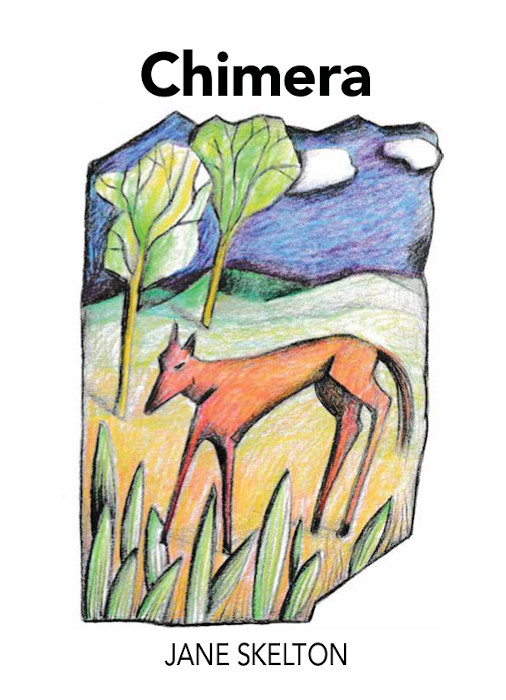 Reviewed by Beatriz Copello
Reviewed by Beatriz Copello
Chimera
by Jane Skelton
Rochford Press
Chimera is chapbook by Jane Skelton, Skelton is an award-winning author, her stories and poetry have appeared in a wide range of literary magazines and anthologies. In this collection, which includes some quaint illustrations by Louise Kerr, the reader will find some poems and short stories. It is interesting to note how in such a small book the author has captured such strong emotions, emotions divorced from sentimentality, the writer also covers issues that lead to reflexion.
I would love to have read more of the writer’s poetry as the small sample in the book are very engaging and demonstrates her skills. Note the rich imagery in the following poem titled “Travel”:
The small wooden boats are abandoned shoes, snow-laden
lying together in the bank,
one called ‘Siesta’.
The forest, reversed, buzzes in the lake’s skin.
The conifers are beseeching, with cumbrous arms, bears’ paws.
Soft flurries silent;
a strange bird call – a shriek, repeated
or a voice, disembodied
and once, a muffled far-off gunshot.
I don’t know why I’m here, but keep going,
aimless, tramping the snow yellow,
the crackling crust
that will only get deeper,
in the mythic wood,
toward the low sun, a squashed, tangerine grin
on the loaded sky.
The water, the forest, the sun, all open a door into a world where the ‘I’ in the poem finds herself in the idealised beauty of nature, yet a gunshot brings reality to the front.
The first story in the book is “A Fresh Start” which has as the main character a young girl named Tessa, through her eyes we find out that she and her family are moving North. The reader never finds out why they are moving which give raise to all sort of conjectures such as are the parents changing jobs, are they escaping from something, what are they leaving behind, are they searching for a new horizon. All of these makes the story very interesting.
The imagery in “A Fresh Start” is very well achieved like in the following paragraph:
“Tessa stared at farmland, at the ploughed fields, the red-brown earth. All along the ridges, the trees were tall, hooded, packed close, pressing in. The trees’ reflections wavered, buzzed in the lakes. White swans flapped in unison, formed into jagged pencil lines on the sky, which was blue-white, cloud heavy. The temperature dropped. The family’s clothes were inadequate and Tessa was always cold. She put her hand against the steamed-up window, looked out through the watery outline of her palm.” In all the other stories as well the author has achieved imageries of cinematic quality.
The writer tells us that the story “Nesta Pine and the Princess” was inspired by Patrick White’s novella “A Woman’s Hand” in The Cockatoos: Shorter Novels and Stories. She also says that: “It adds flesh to the backgrounds of white’s minor characters, Nesta Pine and Addie Woolcock. This story is a small gem, with well-defined and fascinating characters, about two women, love and power. The following is a short paragraph from the story from the point of view of Nesta:
“The young men were never allowed to stay the night, after all. She’d spy them edging along the deck, gulping a scotch, sometimes gone in drink. Then she’d approach the cabin door and gently nock, always to be greeted by the Princess’s pale blue eyes, her sarcastic mouth.
Nesta knew how to touch a creamy breast, to take the nipple between her teeth just, just gentle enough. Her fingers would find what was all the softer for encasing silk. It was only Nesta who knew the Princess’s very heart, who knew her fears.”
In this collection there are three more stories, two short and one longer titled like the book ‘Chimera’. The very short one, titled “The Photo Album” packs a lot of meaning, memorabilia and sensibility. “On the Edge of Border Town”, the other short story and relates to a trip to Thailand with some callous moments and the raising of questions.
“Chimera” is an intriguing story which maintains the suspense for a while, not until later in the story does the reader find out the purpose of the trip a father and his very young son. The story is told from the point of view of Dale, as the story develops you wonder: Is he a criminal? Why are they hiding? What is this character escaping from?
Dale’s son Niles despite his young age also wonders where they are going, as 1 is evident in the following short dialogue:
“Lights! Shrieks Niles.” His shrill voice piercing Dale’s head.
“No, no lights now, mate, later,” he says gruffly.
“Why are we here?” the boy asks for the hundredth time.
“We’re on a journey.”
“What that?”
“It’s a trip, like a holiday.”
“Why?”
Chimera says a lot in so few pages, Skelton makes the reader enter moments, fragments of time, the land, life: imagined and real. In this book Skelton once more has demonstrated her skills as a writer.
About the Reviewer: Dr Beatriz Copello is a former member of NSW Writers Centre Management Committee, she writes poetry, reviews, fiction and plays. The author’s poetry books are: Women Souls and Shadows, Meditations At the Edge of a Dream, Flowering Roots, Under the Gums Long Shade, and Lo Irrevocable del Halcon (In Spanish). Beatriz’s poetry has been published in literary journals such as Southerly and Australian Women’s Book Review and in many feminist publications. She has read her poetry at events organised by the Sydney Writers Festival, the NSW Writers Centre, the Multicultural Arts Alliance, Refugee Week Committee, Humboldt University (USA), Ubud (Bali) Writers Festival.